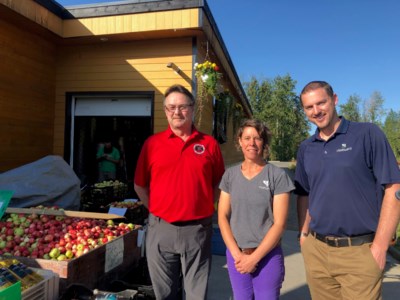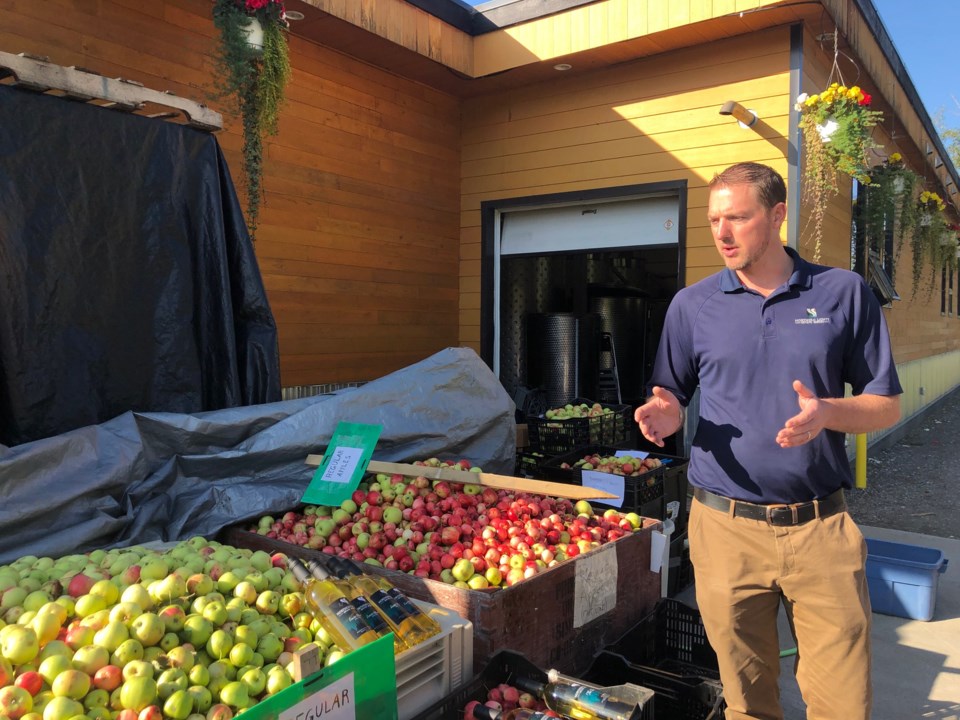Northern Lights Estate Winery is entering its fifth season partnering with the Northern Bear Awareness Society to collect apples around the community.
Over the last five years, the winery has collected more than 50,000 pounds of apples donated from residents. The goal this year is to collect more than 25,000 pounds of apples from around the northern capital.
 Dave Bakker with the Northern Bear Awareness Society and Northern Lights Estate Winery's Doug Bell and Noemie Touchette announce the fifth year of partnership between the two groups. (via Hanna Petersen)
Dave Bakker with the Northern Bear Awareness Society and Northern Lights Estate Winery's Doug Bell and Noemie Touchette announce the fifth year of partnership between the two groups. (via Hanna Petersen)“We really don’t want to see that continue to happen and we really want to expose this program to more of the province so this year we are trying to collect 25,000 pounds of apples, which we think is very achievable.”
The idea for the program came about in early 2015 when the winery met with the Northern Bear Awareness Society to discuss how to reduce the attractant levels that occur in areas of the city where bear activity is high year after year.
“At this time of the year, apples are a major role-playing attractant,” says the society's Dave Bakker. “They are a high source of sugars and fattening materials that bears require before hibernation.”
He says that although there have only been 14 bears destroyed in the community so far this year (which is a lower number than previous years), people should still be sure to address their bear attractants.
“There have been very few calls that were made this year but that doesn’t mean we have to get complacent about what we are doing. We still have to address our attractants, because at this time of the year, apples play a huge role so it’s still important to be mindful of what is going on under your trees.”
Northern Lights will be accepting apples for the next four weeks, starting today (Aug 22). The program also has a small team of individuals that can pick apples for homeowners who are unable to pick their own fruit.
The winery crushes the apples into a juice, which is then frozen before it’s used to make apple wine.
“We blend all different types and that is the secret of every vintage. Every year has a different flavour because it has a different concentration of crab apples and regular apples,” says Noemie Touchette, the winery’s director of operations.
“We are looking for apples that are ripe, not rotten. In order to tell if they are ripe, you cut one in half and see if the seeds are black. If the seeds are black, they are ready to go,” says Bell.
He also notes that there are a variety of other things people can do with their apples, including donating them to the Northern Lights Wildlife Shelter or connecting with people on the Prince George Fruit Exchange.
Bakker adds the 25,000-pound goal is not lofty.
“The amount of apple trees that are unattended in our city is phenomenal. I’ve counted up to 30 trees on one cul-de-sac,” says Bakker. “It’s achievable, so we just have to get people motivated to do something proper with their apples.”
Northern Lights Estate Winery is located at 745 PG Pulpmill Rd.



